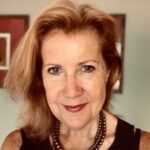According to Changing the Narrative group and their partners, ageism is a real problem in the healthcare industry. It impacts our health, lifespan, and economy. In partnership with the Boulder County Area Agency on Aging (BCAAA), Changing the Narrative created a short video, a compilation of interviews with professionals and advocates who serve older adults and are experts in their fields.

Janine Vanderburg
“Our goal for this campaign is to teach people about the connections between ageism and poor health outcomes and to mobilize both older people and health professionals to advocate for more age-friendly and age-inclusive health systems,” said Janine Vanderburg, Director of Changing the Narrative.
In November, a virtual webinar discussed ageism in the healthcare industry. The panelists included host Janine Vanderburg with Changing the Narrative; Danelle Hubbard, BSW, MA, Gerontologist; Dr. Jeffrey Wallace, MD, MPH, with CU-Anschutz and Multidisciplinary Center on Aging; Tony Tapia with the Governor’s Strategic Action Planning Group on Aging; Dr. Carolyn Love, Ph.D., with Kebaya Coaching & Consulting; and several others.
Introductions were provided by Janine Vanderburg followed by a brief message by Boulder County Area Agency on Aging. “We were excited to partner with Changing the Narrative on this video because ageism is an issue that has a direct impact on the health and well-being of older adults in our community,” said Christine Vogel, division manager for the Boulder County agency. “We are dedicated to supporting older adults and raising awareness about ageism, and this video is an integral part of this effort.”
The video “Antidotes for Ageism” discusses the issues with ageism with older healthcare patients by a panel of advocates and experts in the healthcare industry. All of the featured panelists discussed their views on how ageism affects older adults and methods to overcome ageism.
Elder Speak, a negative use of older adult terminology such as “Sweetie” or “Honey” is viewed by some older generations as derogatory or even patronizing. It’s highly recommended not to use this form of greeting in a professional setting.
Geriatric doctors or gerontologists need to relate to their patients by asking questions on their conditions than making assumptions and understanding their patient needs. After all, most older patients know more about their conditions than anyone. One panelist made reference to assumptions are made of older adults not aware of their own health problems.
After the video, panelists talked about creating age-friendly healthcare with some of the older adults and health care professionals featured in the video.
Dr Wallace indicated that most doctors spend 15-20 minutes with their patients, but geriatric doctors spend about 30-40 minutes with their older patients on resolving chronic problems. Patients have the authority to tell their doctors what their needs are, and doctors should accept what a patient is telling them!
He also recommended the healthcare industry should focus on older adults’ healthcare versus the economic results. He explained more interdisciplinary action is needed between healthcare teams.
There has been a shortage of healthcare staff due to the pandemic. Panelist Guillane Lee recommended more students focus on older adults in new careers. One fact is by year 2034, older adults will outnumber younger adults, thus a new opportunity exists in the growing geriatric care market.
Tony indicated more healthcare data is needed for older adults over 65 years to create the best policy at the state level. He explained that longer term policies are needed over short term solutions.
In summary, the webinar met its goal of informing the attendees about ageism in the healthcare industry and methods to resolve ageism.
